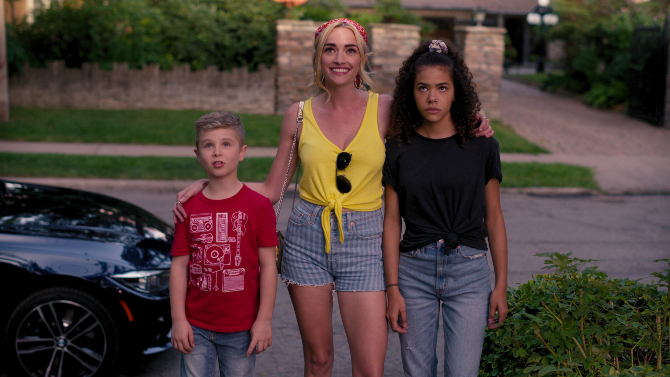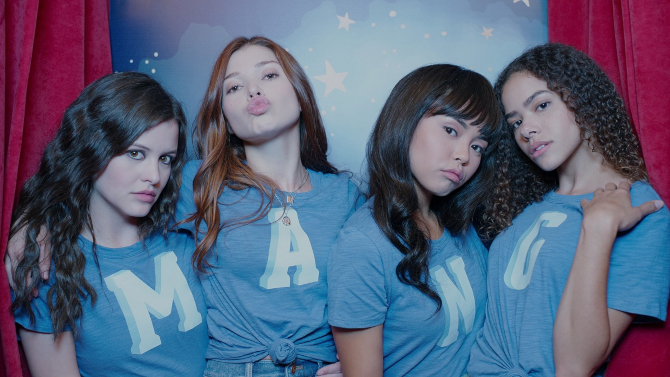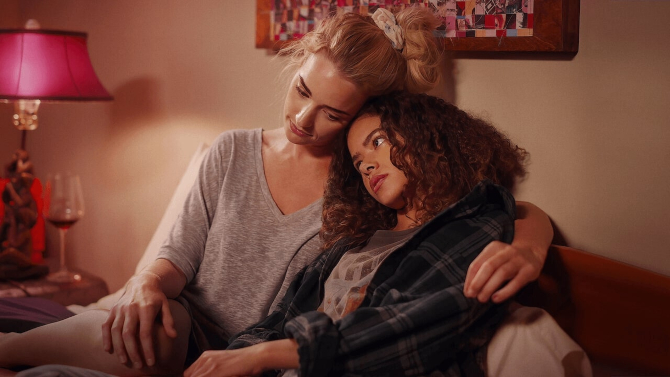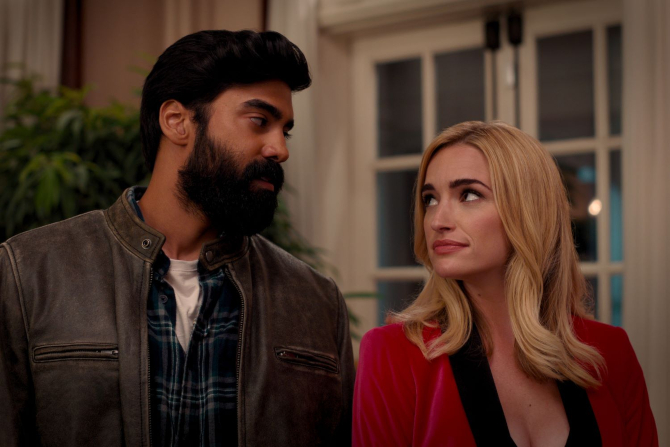Opinion: Taylor Swift fires back at Netflix’s ‘Ginny & Georgia’ but what does the show say about gender equality in 2021?

In the month of International Women’s Day, Netflix’s Ginny & Georgia has stirred up some sexist drama. At its core, the show really attempts to discuss western (a.k.a America’s) views and expectations on women, especially young girls. However, even with the best intentions, the storyline may have (at times) missed the mark. Case in point, in the first episode, the lead character Virginia “Ginny” Miller, played by Antonia Gentry, makes a joke at Taylor Swift’s expense saying “What do you care? You go through men faster than Taylor Swift”.
Here’s what Swift had to say in response:
Hey Ginny & Georgia, 2010 called and it wants its lazy, deeply sexist joke back. How about we stop degrading hard working women by defining this horse shit as FuNnY. Also, @netflix after Miss Americana this outfit doesn’t look cute on you Happy Women’s History Month I guess pic.twitter.com/2X0jEOXIWp
— Taylor Swift (@taylorswift13) March 1, 2021
So, to answer the question, was Taylor Swift right to openly call out the Netflix show on Twitter? Yes, of course she was. However, there’s more at play here than a decade-old joke. Admittedly, when I first heard the line, I didn’t give it a second thought. The topic of Taylor Swift’s love life and her “rotational boyfriends” has been something I’ve heard about since I was in high school. Was it funny? No. Did it add to the storyline to bring down another woman? No. Was it a pop-culture reference that is easily recognisable? Yes. And that’s precisely the problem. It’s about time women’s love lives stopped being the punch line of a joke. Especially when Swift’s peers—the likes of John Mayer, Ed Sheeran, Michael Bublé and Justin Timberlake (just to name a few)—have been known to be consummate “players” who write about their former flames in their songs. The View’s Meghan McCain actually had an informative stance on the topic. She called the line a “microaggression” and stated that it “sets the precedent that we as women should just lighten up and take it. That it’s so funny. That it’s ok, you’re just not in on the joke when really it’s very hurtful. It’s very degrading and it’s not something you hear about male entertainers.”
Reactions online have been mostly supportive of Swift, though some do also praise the show. Here’s how Twitter reacted to Swift’s call out:
i love how one of the things for “Ginny and Georgina” is “empowering women” yet they literally dragged Lady Gaga, Lana del Rey, and Taylor swift….
— currently: alright (@That_One_Jaxon) March 1, 2021
harassing the actors of ginny and georgina and also spreading the respect taylor swift everywhere is crossing the line.
— ًandrew (@froggyandrew) March 2, 2021
IF SOMEONE COMES AT US THIS TIME I’M READY- TAYLOR SWIFT pic.twitter.com/EF4xszSMbz
— Nick//fearless era (@Thearcher013) March 1, 2021
once again pic.twitter.com/Q7syIHiQUR
— amira (taylor’s version) (@amitoowell131) March 1, 2021
ginny and georgina was good I’m sorry taylor swift
— ace °₁₂₇ stream chenle too good (@yirace_) March 3, 2021
They never mention Taylor swift again in Ginny and Georgina everything is supposed to be a joke it’s actually a really good show
— georgexddream (@amazinggeroge) March 3, 2021

I watched the full season so bear with me as I give you my take. The plot delves into problems familiar to teens. High-school kids (both boys and girls) are nasty. Girls use their “bit*chy-ness” to hide their insecurities and boys are disgusting creatures who only have sex on their minds. I never went to an American high school, but this trope is one we’ve seen before. It’s been in every ’80s high school rom-com and growing up, it was seen on teen classics like 2004’s Mean Girls and 2010’s Easy A. So the show’s writers offset this (overused) plot with a twist: presenting the high-school context under the lens of 2021, leaning into the “woke” culture of Millennials and Gen Z. There are multiple instances where intolerance is called out. The show accepts and normalises queer issues while also highlighting social issues faced by minorities living in the US, black lives in particular.

Here’s the problem. Viewers are made aware of the difficulties portrayed by the characters. For instance, Ginny resorts to self-harm in moments of anxiety and stress. Abby (played by Katie Douglas) has body dysmorphia and tapes her thighs with duct tape. Both Abby and Norah (played by Chealsea Clark) display traits of kleptomania when they attempt to steal items from a local boutique and end up pushing the blame on Ginny. To top it off, Ginny’s AP English teacher racially profiles her, singling her out in class on multiple occasions. The issue is that a lot of real problems faced by young adults are introduced but never fully resolved. As viewers, we don’t see these characters evolve. If anything, they seem to run away from the problems at hand than actually tackling them head-on. But that’s the opposite of how one is supposed to solve issues, right? Keep in mind some of these are heavy issues that may really resonate with young audiences. As a result, it comes across as adults writing scripts about high schoolers without the appropriate context or references.

Ginny & Georgia is a combination of Thelma & Louise and Gilmore Girls, in the way it deals with a mother-daughter relationship but incorporates a sense of adventure and deviance. Brianne Howey plays the role of Ginny’s 30-year-old, free-spirited mother Georgia and she does so flawlessly. Her character is energetic, ruthless, persistent, charming and very easy to fall in love with. The chemistry she has with her onscreen daughter is effortless. It’s compelling to watch Ginny as she grows while learning more about who she is and adjusting to her new surroundings. It was also refreshing to see two men of colour, Raymond Ablack as Joe and Nathan Mitchell as Zion, playing two central characters portrayed as suave, dashing potential love interests.

The show also depicts the struggles of a single mother raising two children and despite her criminal activity, Georgia is a very lovable character. She is attractive, surrounded by men, and conditioned in such a way where she puts so much value on her looks because that’s the biggest “weapon” at her disposal. She is also a victim of sexual assault, giving the series an uplifting edge in the way it shows survivors of abuse being able to overcome terrible circumstances. So ultimately, that’s the problem. The show is set up to be extremely pro-women (which it truly is) but then at the same time, takes jabs at other women. Unfortunately, much like Netflix’s I Care A Lot, the show ends up displaying these strong characters as having to resort to terrible and desperate means to get out of their dreadful situations.
Back to Taylor Swift. The singer was right to call out the misogynistic joke. Netflix is a huge company and they should most definitely be held accountable. But here’s when the line gets crossed: Fans of Swift are now directing their outrage at Antonia Gentry, the 23-year-old actress who plays Ginny. Buzzfeed reports that some of the comments are openly racist. At the end of the day, Gentry is a young actress in her first major role. She was simply reading lines from a script. If people have anger, they should take it out at the people at Netflix. Furthermore, tearing another woman down is not what women’s empowerment is about.
Gentry kept it classy, responding to the comments by posting an IG story from The Washington Post, with a screenshot that stated “317 girls aged 12 to 16 were abducted from a school in Nigeria on Friday and there’s barely a squeak in the media. What a world we live in.”
In an IG post, she thanked fans of the show and expressed gratitude for the opportunity to portray a complex biracial character, without directly addressing the Swift backlash.
</ iv>
View this post on Instagram
“Thank you for the love and support you have shown me and our show, Ginny and Georgia, over the last week,” she wrote. “I never would have imagined something like this as a young girl — that is, having a voice capable of impact. It is so meaningful to see the hundreds of messages from fans in my inbox who feel seen, heard and understood because of the show and its characters.
“As someone who grew up feeling voiceless and unimportant, and who did not see herself reflected on screen, Ginny Miller was finally a reprieve. Finally, a character who was just as confused and imperfect as I was gets a chance to exist. Ginny Miller, though fictional, is a character who reflects all of life’s contradictions and imperfections.”
It about time we lift up one another and shine a light on the real issues that matter. At the end of the day, the journey to equality is still an uphill battle.
| SHARE THE STORY | |
| Explore More |



